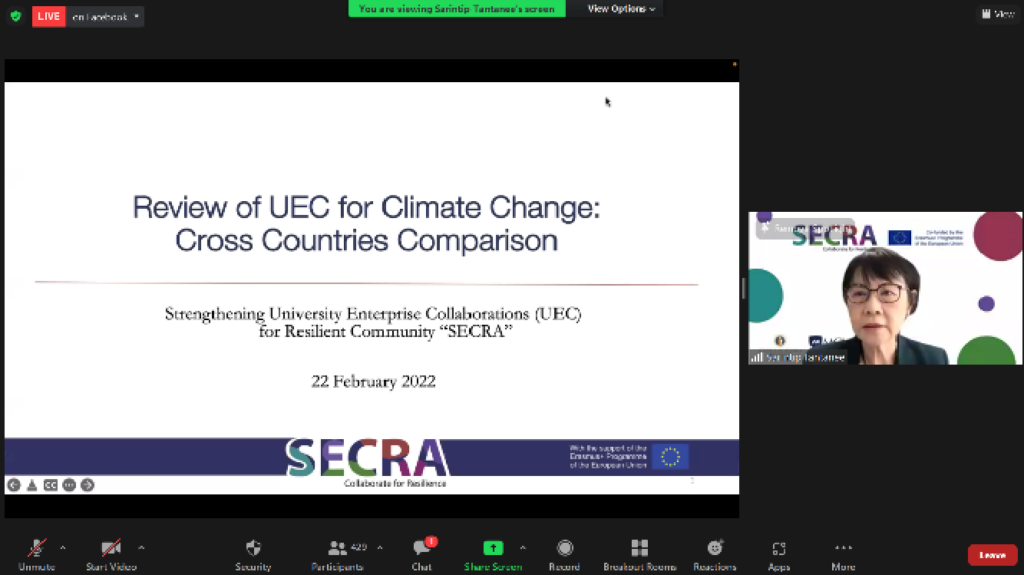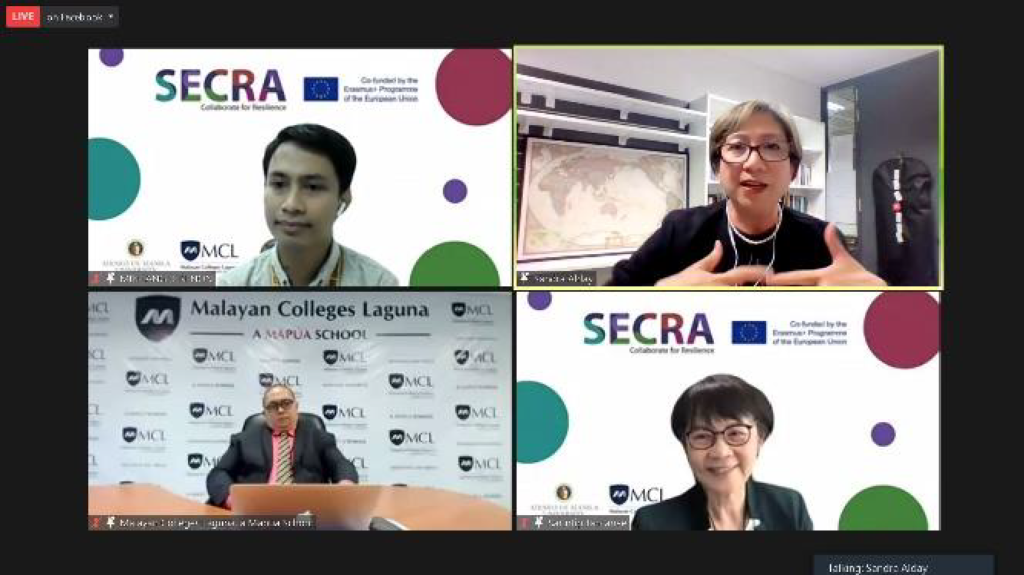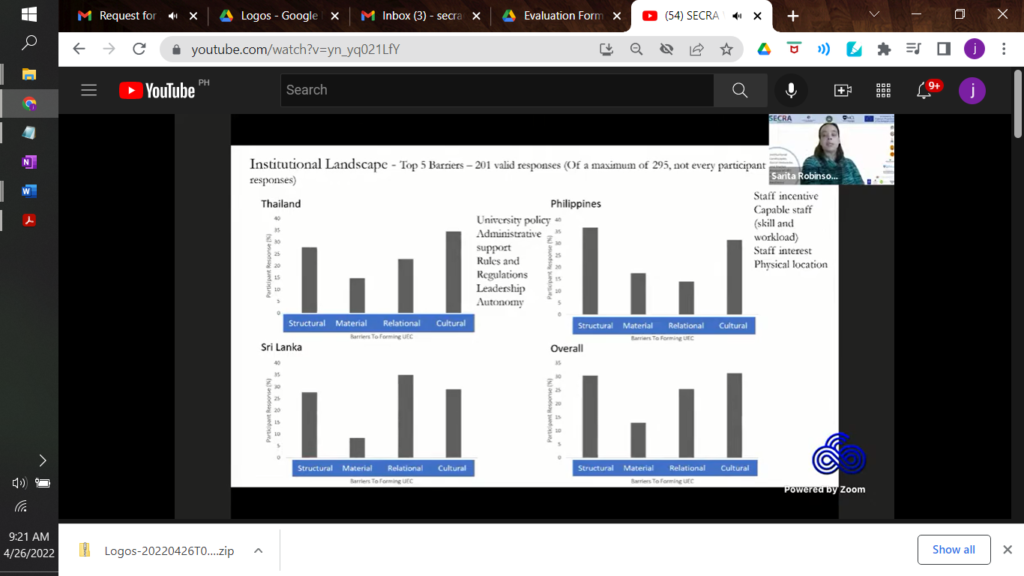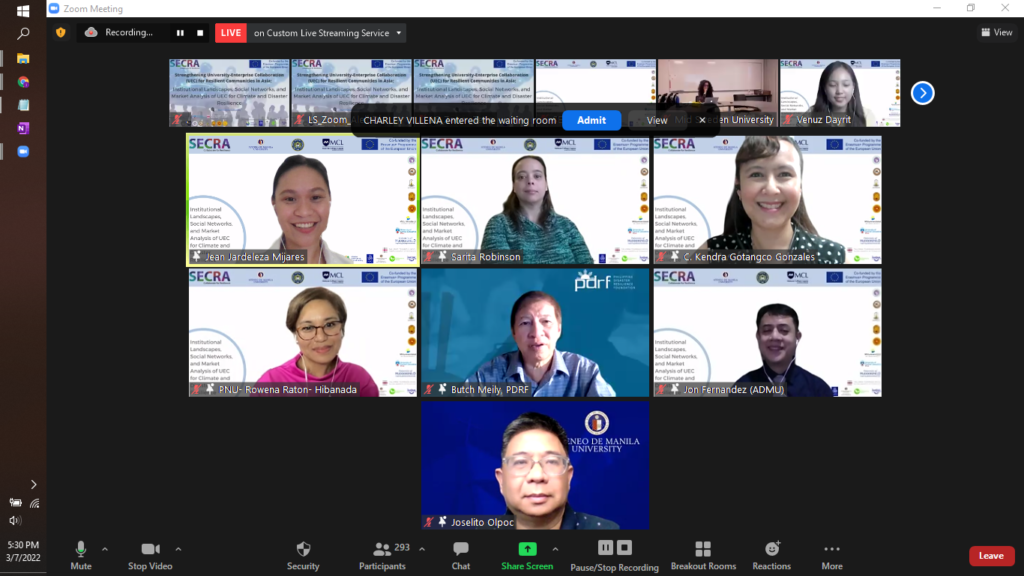The SECRA Philippine partner universities held a series of webinars in February and March 2022 to share the results and analyses of studies conducted on the current state of UECs in selected Asian countries and surveys with key stakeholders on UECs. These analyses focused on mapping the collaborative landscape of institutions and enterprises in SECRA partner countries in Asia – Philippines, Sri Lanka, and Thailand.
The first installment of the webinar was hosted by the Philippine Normal University, and it was held online via the Zoom platform last 22 February 2022. The webinar was titled, “Review of UEC for Climate and Disaster Resilience: Cross-Country Comparison”. For this webinar, Professor Sarintip Tantanee of the Naresuan University, one of the institutions in the SECRA consortium, was invited to share the findings from a review of literature or scoping on the state of UECs in the Philippines, Sri Lanka, and Thailand. Invited to give their reaction were three panelists, Dr. Maria Elvira A. Asuan, the Director of PNU – Linkages and International Office, Mr. James Ronald O. Mesina, Director of the Office for Strategic Partnerships and Global Engagement of Malayan Colleges Laguna, and Dr. Sandra Alday, visiting professor in Ateneo de Manila University and lecturer and Dalyell Program Director in the University of Sydney.

In her presentation, Professor Tantanee highlighted the gaps and best practices of existing UECs in the three countries. She shared what were found to be the factors for successful UECs, the advantages of UECs for universities and for enterprises, and the government support and policies in place for UECs in these countries. Among the gaps she mentioned was the lack of UEC programs and projects directed towards disaster resilience and the need to develop business models integrating disaster reduction and management.
Noting the gaps in UEC shared by Professor Tantanee, Dr. Asuan in her reaction highlighted the importance of collaboration for disaster resilience and of integrating the principles of disaster risk reduction in curricular and co-curricular activities. She conveyed that universities are in a unique position to build capacity through empowering human resources toward resilience.
Mr. Mesina’s reaction revolved around opportunities for further research, highlighting the importance of institutional leadership and the opportunities for public schools to impact disaster resilience. He shared about teacher empowerment mechanisms and how universities can be a leader in not just instructional aspects, but also in research and extension service. He also posed several questions for the viewers to ponder upon, such as, “How can universities bridge the gap and provide solutions to industry problems?” and “What are some lessons to be learned in terms of providing incentives to sectors who are willing to collaborate with the academe?”
Dr. Alday invited the audience to share some of their insights as she gave her reaction, among them about what the audience understands or thinks is the purpose of universities. She highlighted that among the important roles of the university is the creation of knowledge and policy engagement. She conveyed that there is much to be learned from the Philippines, Sri Lanka, and Thailand based on Professor Tantanee’s presentation, and that these countries should lead the way in creating knowledge and engaging with policymakers for building resilience. She also highlighted the need to rethink the models we use in engaging with various stakeholders to find opportunities to collaborate for research, education, and policy engagement.

The first installment of the webinar series was attended by 455 participants from the Philippines, Sri Lanka, and Thailand, with around 800 viewing the Facebook live stream accessible through this link https://fb.watch/bkgUzc2opS/.
The second installment of the webinar series was hosted by Ateneo de Manila University last 7 March 2022 via Zoom. The event was titled, “Institutional Landscapes, Social Networks, and Market Analysis of UEC for Climate and Disaster Resilience”. For this webinar, Dr. Sarita Jane Robinson from the University of Central Lancashire was invited to share key insights derived from surveys on UECs for climate action and disaster resilience. The surveys were conducted with administrators, faculty, researchers, and representatives from various enterprises, including government offices, businesses, and non-government organizations.
A panel of reactors were also invited to provide insights and discuss possible opportunities for collaboration arising from the presentation of Dr. Robinson, these were Mr. Rene “Butch” S. Meily, President of the Philippine Disaster Resilience Foundation (PDRF), and Dr. Rowena Raton-Hibanada, Director of the Community Partnership and Extension Office (CPEO) of the Philippine Normal University (PNU).

Dr. Robinson shared in her presentation the barriers identified from the surveys, such as time delays, lack of administrative support and bureaucratic procedures on liquidation of funds, procurement of equipment, and arranging contracts. She also shared that staff work loads, lack of relevant expertise, and lack of incentives were among the capability barriers experienced by the survey respondents, and that enterprise partners were keen to engage in UECs, highlighting however relational issues such as communication and shared goals as barriers to UECs.
Mr. Meily, the first panelist to give his reaction, agreed with the point shared by Dr. Robinson on the importance of relationships in UECs, reiterating that trust is critical and that documents such as memoranda of agreement are important in setting expectations. In his talk, Mr. Meily presented and shared the various opportunities for collaboration between universities and organizations such as PDRF. These include learning opportunities for students in their Emergency Operations Center in Clark, Pampanga; training courses on business continuity, offering academic programs such as a master’s program in disaster risk and crisis management; and highlighting as well their start-up incubators focused on disaster and climate resilience.
Dr. Raton-Hibanada shared in her discussion the extension work of PNU, particularly on the literacy initiatives with the communities they cater to. She shared that disaster preparedness and disaster resilience are part of the literacies they teach their community partners and that their initiatives are centered on empowering stakeholders – teachers, school heads, non-academic administrators, parents, barangay leaders – toward disaster resilience. She also highlighted the importance of focusing on human-centered recovery, listening to different voices in the community, and addressing the diverse needs of individuals in the community. She shared that to empower the community, they would convene various stakeholders and partners yearly including NGOs, local government offices, international government organizations, and industry partners to discuss how to better help the communities especially as the communities face various disasters – not just due to exposure to climate hazards but also geologic and health hazards, examples being the eruption of Taal Volcano in 2020 and the experience during the pandemic.

About 450 participants from the Philippines, Thailand, UK, and Australia coming from 21 different institutions and companies joined this second installment of the webinar via Zoom and Youtube live stream.
